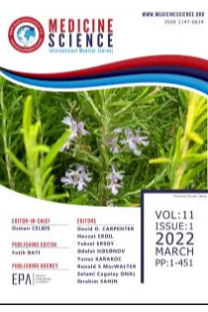The Efficacy of Elemental Zinc on Acute Diarrhea in Egyptian Infant and Children
___
1. Brown KH, Hess SY, Vosti SA, Baker SK. Comparison of the estimated costeffectiveness of preventive and therapeutic zinc supplementation strategies for reducing child morbidity and mortality in sub-Saharan Africa. Food Nutr Bull. 2013;34(2):199-214.2. Grimwood K, Forbes DA. Acute and persistent diarrhea. Pediatr Clin N Am. 2009;56(6):1343-61.
3. Ali AA, Abdelrahim ME, Elmoslamy NA, Said AS, Meabed MH. Comparison Between Nitazoxanide and Metronidazole in the Treatment of Protozoal Diarrhea in Children. Med-Science. (In Press).
4. John S, Nuru P. Admission patterns and outcomes of paediatric patients admitted at the diarrhea unit of muhimbili national hospital (MNH). Dar Es Salaam Medical Students J. 2010;15(1):9-12.
5. Caulfield LE, de Onis M, Blössner M, Black RE. Undernutrition as an underlying cause of child deaths associated with diarrhea, pneumonia, malaria, and measles. Am J Clin Nutr. 2004;80(1):193-8.
6. Dutta P, Mitra U, Dutta S, Naik TN, Rajendran K, Chatterjee MK. Zinc, vitamin A, and micronutrient supplementation in children with diarrhea: a randomized controlled clinical trial of combination therapy versus monotherapy. J Pediatr. 2011;159(4):633-7.
7. Walker, CLF, Black RE. Zinc for the treatment of diarrhoea: effect on diarrhoea morbidity, mortality and incidence of future episodes. Int J Epidemiol. 2010;39(suppl 1):i63-i69.
8. Bhandari N, Taneja S, Mazumder S, Bahl R, Fontaine O, Bhan MK. Adding zinc to supplemental iron and folic acid does not affect mortality and severe morbidity in young children. J NUTR. 2007;137(1):112-7.
9. Sazawal S, Black RE, Ramsan M, Chwaya HM, Dutta A, Dhingra U, Stoltzfus RJ, Othman MK, Kabole FM. Effect of zinc supplementation on mortality in children aged 1-48 months: a community-based randomised placebo-controlled trial. Lancet. 2007;369(9565):927-34.
10. Tielsch JM, Khatry SK, Stoltzfus RJ, Katz J, LeClerq SC, Adhikari R, Mullany LC, Black R, Shresta S. Effect of daily zinc supplementation on child mortality in southern Nepal: a community-based, cluster randomised, placebo-controlled trial. Lancet. 2007;370(9594):1230-9.
11. Patel A, Dibley MJ, Mamtani M, Badhoniya N, Kulkarni H. Zinc and copper supplementation in acute diarrhea in children: a double-blind randomized controlled trial. BMC Med. 2009;7(1):22.
12. Brooks WA, Santosham M, Naheed A, Goswami D, Wahed MA, Diener-West M, Faruque AS, Black RE. Effect of weekly zinc supplements on incidence of pneumonia and diarrhoea in children younger than 2 years in an urban, lowincome population in Bangladesh: randomised controlled trial. Lancet. 2005;366(9490):999-1004.
13. Penny ME. Zinc Supplementation in Public Health. Ann Nutr Metab. 2013;62(Suppl. 1):31-42.
14. Young M, Wolfheim C, Marsh DR, Hammamy D. World Health Organization/United Nations Children's Fund joint statement on integrated community case management: an equity-focused strategy to improve access to essential treatment services for children. J Trop Med Hyg. 2012;87(5):6-10.
- ISSN: 2147-0634
- Yayın Aralığı: 4
- Başlangıç: 2012
- Yayıncı: Effect Publishing Agency ( EPA )
Horse-shoe Shaped Kidney in Fetusand its Associated Variations: A Case Report
Sushma RK, Antony Sylvan DSOUZA
Spontaneous Rupture of the Ascending Thoracic Aorta in Young Man
Mehmet Cengiz ÇOLAK, NEVZAT ERDİL, Ercan KAHRAMAN, Ramazan KUTLU, Bektaş BATTALOĞLU
The Efficacy of Elemental Zinc on Acute Diarrhea in Egyptian Infant and Children
Yassmin M. KAMAL, Mohamed E. ABDELRAHİM, Amira S. A. SAİD, Osama E. BOTROUS, Adel Ahmed AHMED, Mohamed H. MEABED
Can Propolis Be Protective against to Ethanol-impaired Anxiety and Unconditional Fear?
Zumrut Yilmaz DOGAN, Memet Hanifi EMRE
[Diş Hekimliğinde Artık Monomerler: Bir Literatür Derlemesi]
Veli Alper GORGEN, ÇİĞDEM GÜLER
Investigation the Relationship of Lower Urinary Tract Symptoms with Vascular Risk Factors
Soner COBAN, M. Sakir ALTUNER, SONER CANDER, Ali Rıza TÜRKOĞLU, Muhammet GUZELSOY, ÖZEN ÖZ GÜL, Ali TEKİN
[Hekim Bakış Açısı İle Cinsiyetin Hekimlik Mesleğine Etkisi]
Orhan MERAL, Cetin KOSE, AHSEN KAYA, Aytaç KOÇAK, Ekin Özgür AKTAŞ
Occipital Nerve Blockage in Cervicogenic Headache: A case Report and Brief Review of Literature
Post-Traumatic Fibular Aneurismal Bone Cyst: A Case Report and Review of the Literature
